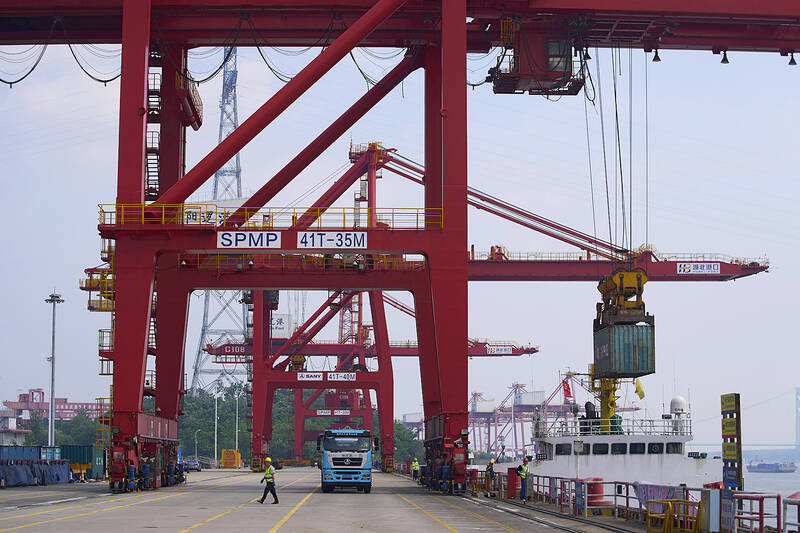China’s industrial firms saw their profits drop the most since October last year, illustrating weakness in an economy strained by higher US tariffs and lingering deflationary pressure.
Industrial profits fell 9.1 percent last month from a year earlier, data released Friday by the Chinese National Bureau of Statistics (NBS). The reading for last month reversed a modest gain earlier this year and took decline in the first five months to 1.1 percent.
Highlighting the headwinds from persisting deflationary risks, profits of automakers plunged 11.9 percent year-on-year from January to last month, the worst drop since the first quarter of 2023. Car companies have engaged in a brutal price war, fueled by an intense competition for market share as well as rising trade barriers.

Photo: AP
The deterioration bodes ill for business confidence and could make companies more reluctant to invest and hire. It also highlights the need for more government stimulus by Beijing to ensure meeting its annual growth target of about 5 percent — even though some economists turned less bearish on the outlook after a truce in the trade war with the US and a recovery in consumption lately.
Earnings declined this year mainly due to “insufficient effective demand, falling prices of industrial products and short-term volatilities,” NBS analyst Yu Weining (于衛寧) said in a statement accompanying the release.
Profits weakened even as China’s industrial companies benefited from the government’s program to subsidize upgrades of equipment and consumer goods by businesses and households.
Thanks to the program, earnings of companies making equipment for manufacturing smart consumer devices more than doubled in the first five months of the year from the same period a year ago.
Manufacturers of general equipment and household kitchen appliances also saw double-digit profit growth.
Last month’s contraction in industrial enterprises’ earnings came despite a 5.8 percent expansion in industrial output, NBS data showed.
The overall industrial profits of 2.72 trillion yuan (US$379 billion) in January to May was more than one-fifth less than during the same period in 2021 and 2022.
Mining continued to lead the drops in profits among industrial firms, with the fall deepening to 29 percent in the first five months from a year earlier, the NBS data showed.
Miners and processors of coal and ferrous metals saw even deeper contractions of at least 45 percent. State-owned enterprises, which dominate the mining industry, saw widening profit plunges as a result.
Despite the drag from carmakers, manufacturers as a whole managed to eke out a 5.4 percent growth in profits in the period, while utilities saw a 3.7 percent gain.

Sweeping policy changes under US Secretary of Health and Human Services Robert F. Kennedy Jr are having a chilling effect on vaccine makers as anti-vaccine rhetoric has turned into concrete changes in inoculation schedules and recommendations, investors and executives said. The administration of US President Donald Trump has in the past year upended vaccine recommendations, with the country last month ending its longstanding guidance that all children receive inoculations against flu, hepatitis A and other diseases. The unprecedented changes have led to diminished vaccine usage, hurt the investment case for some biotechs, and created a drag that would likely dent revenues and

Macronix International Co (旺宏), the world’s biggest NOR flash memory supplier, yesterday said it would spend NT$22 billion (US$699.1 million) on capacity expansion this year to increase its production of mid-to-low-density memory chips as the world’s major memorychip suppliers are phasing out the market. The company said its planned capital expenditures are about 11 times higher than the NT$1.8 billion it spent on new facilities and equipment last year. A majority of this year’s outlay would be allocated to step up capacity of multi-level cell (MLC) NAND flash memory chips, which are used in embedded multimedia cards (eMMC), a managed

CULPRITS: Factors that affected the slip included falling global crude oil prices, wait-and-see consumer attitudes due to US tariffs and a different Lunar New Year holiday schedule Taiwan’s retail sales ended a nine-year growth streak last year, slipping 0.2 percent from a year earlier as uncertainty over US tariff policies affected demand for durable goods, data released on Friday by the Ministry of Economic Affairs showed. Last year’s retail sales totaled NT$4.84 trillion (US$153.27 billion), down about NT$9.5 billion, or 0.2 percent, from 2024. Despite the decline, the figure was still the second-highest annual sales total on record. Ministry statistics department deputy head Chen Yu-fang (陳玉芳) said sales of cars, motorcycles and related products, which accounted for 17.4 percent of total retail rales last year, fell NT$68.1 billion, or

In the wake of strong global demand for AI applications, Taiwan’s export-oriented economy accelerated with the composite index of economic indicators flashing the first “red” light in December for one year, indicating the economy is in booming mode, the National Development Council (NDC) said yesterday. Moreover, the index of leading indicators, which gauges the potential state of the economy over the next six months, also moved higher in December amid growing optimism over the outlook, the NDC said. In December, the index of economic indicators rose one point from a month earlier to 38, at the lower end of the “red” light.